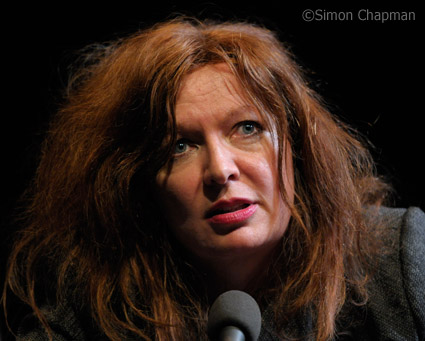
by Robert Buckland
Journalists need to hold those in power to account, but newspaper owners’ cutbacks in recent years mean there are fewer specialist reporters to do that, Mail on Sunday and Guardian columnist Suzanne Moore told the annual Benn Lecture in Bristol on Friday 26th November.
At the same time, major changes in technology are continuing to change newspapers’ role and they are increasingly interpreting news rather than reporting on it, she said.
In a wide-ranging speech titled In The Belly of the Beast: From Margin to Mainstream, Ms Moore told the 100-strong audience how she had gone from working on Marxism Today to writing for the Mail on Sunday – without changing her views.
“I haven’t changed my politics, just where I deliver them,” she said.
In her ten years at the Mail on Sunday she has built a loyal readership – often people who fiercely oppose her Left-leaning, feminist views.
Delivering the fifth annual NUJ/Arnolfini Benn Lecture – which is aimed at opening up the media conversation to the public – Ms Moore said: “I’m loved and hated. I get emails from people saying I’m the reason they buy the paper, I cheer them up.
“But then I get those who say they’ll never buy the paper again if I carry on writing for it. I once asked the editor if that worried him and he said no because they buy it the following week to see if I’m still in there.”
She once received a death threat from neo-Nazi organisation Combat 18. Telling her then fellow Mail on Sunday columnist, former Tory cabinet minister Norman Tebbit, he told her: “You’re no-one until you’ve had a death threat”.
Ms Moore, who has just started writing a weekly column for The Guardian, described being a columnist as a dream job for a freelance journalist. She said she was invited to write for the Mail on Sunday because they wanted a writer with “lefty, feminist” views.
“They think it makes them more pluralistic. The Mail has three million readers and 40 per cent of them vote Labour,” she said. She saw her role as supplying some common sense to issues that the paper took its own, predictable view on – most recently the student riots.
But being a Left-wing writer didn’t mean she agreed with The Guardian’s stance on many issues.
“Guardian readers live in a bubble,” she said during a lively question-and-answer session. “It’s very easy to live in a Guardian world. I think I want to make it less self-satisfied. It needs to engage more. That was summed up by it telling people to vote Lib-Dem (at the last general election).
“All newspapers have an audience. The ultimate fear of the Daily Mail is someone’s having a good time and not paying for it. In the case of women that means they will get cancer. But it’s a paper read by women.”
Sexism is still rife in newspaper offices and they tend to be very masculine places with a long-hour culture that alienated many women journalists, said Ms Moore. “We get pushed into a role. I get offered a lot of celebrity interviews. They say ‘Go on Suzanne – you’re such a people person’ – i.e. a woman. Women write features, men report.”
She expressed concern over staff cuts made by newspaper owners, particularly among specialist and foreign correspondents.
“A lot of papers dismissed their foreign correspondents and now take agency copy. So where will the next Robert Fisk come from? Then you get papers like The metro which is basically press releases turned into articles,” she said.
As a result there is less investigative journalism and crucial issues like the financial crisis in Ireland are not being analysed.
At the same time, technology is changing journalists’ roles and speeding up news delivery. “We have enormous access to instant information but we still have little understanding of how it affects us,” she said.
“Newspapers have less relevance. Their role has changed. You don’t need them for news any more but for interpretation.
“I use Twitter. I find it very useful and now no news story stays exclusive for more than two minutes. There’s a degree of transparency with Twitter. There are no spin doctors or agents.”
